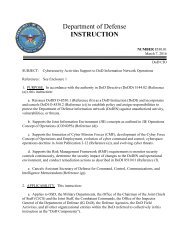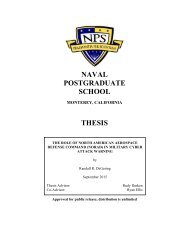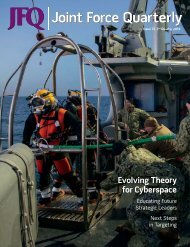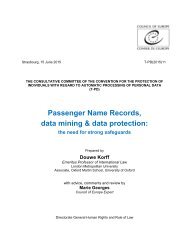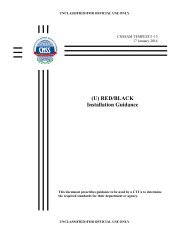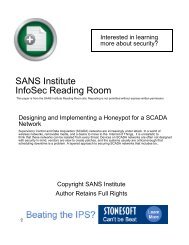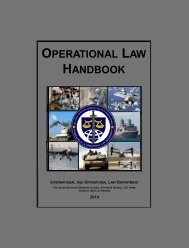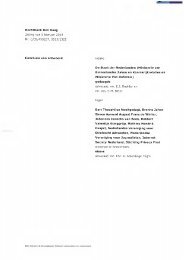jko-catalog-sep-2012
jko-catalog-sep-2012
jko-catalog-sep-2012
You also want an ePaper? Increase the reach of your titles
YUMPU automatically turns print PDFs into web optimized ePapers that Google loves.
* Indicates new courses added to the JKO LCMS after July 2011. The “*” is not a part of the actual course number.<br />
107<br />
JKO Course Descriptions<br />
responsibilities of NATO’s CIS organisation in providing technical support and services to ISAF. It also examines interoperability<br />
challenges between the various networks and nations operating in Afghanistan and the technologies supporting ISAF.<br />
0.5 hour(s)<br />
ISAF Communications Information Systems (CIS) J3OP-MN900-03-03 N,S<br />
The purpose of this curriculum is to train individuals deploying in support of the International Security Assistance Force (ISAF)<br />
in Afghanistan. 0.5 hour(s)<br />
ISAF Overview J3OP-MN900-01-01 N,S<br />
This course is part of a larger ISAF Curriculum. This lesson provides information on the International Security Assistance Force<br />
(ISAF), including its mission, Lines of Operation, and Key Military Tasks. 0.5 hour(s)<br />
ISAF Strategic Communications J3OP-MN900-03-04 N,S<br />
This course is part of a larger ISAF Curriculum. This lesson describes the role of strategic communications within the ISAF mission.<br />
0.5 hour(s)<br />
ISE Core Awareness Training Course J7SN-US347-HB N<br />
The purpose of this course is to provide a common understanding and shared awareness of the Information Sharing Environment<br />
(ISE) and to promote a culture of information sharing within the DoD and across the larger Federal ISE. 1 hour(s)<br />
ISE Core Awareness Training Course J7SN-US347 N,S<br />
The purpose of this course is to provide a common understanding and shared awareness of the Information Sharing Environment<br />
(ISE) and to promote a culture of information sharing within the DoD and across the larger Federal ISE. This course, as<br />
established by Presidential directives, has been designed to promote the culture of information sharing by effecting changes in<br />
attitudes and practices among those who directly and/or indirectly interact with terrorism information. Examples of DoD functional<br />
areas are: criminal investigation, law enforcement, counterterrorism, antiterrorism, force protection, Defense intelligence,<br />
homeland defense, and weapons of mass destruction terrorism. 1 hour(s)<br />
IT Familiarization J3ST-US817 N,S<br />
The purpose of this course is to provide JIEDDO new employees with an understanding of the J-6 IT Support process within<br />
JIEDDO. 0.5 hour(s)<br />
JFC 100 Module 1: Introduction to Joint Fundamentals J3OP-US1141* N,S<br />
The Introduction to Joint Fundamentals course is the first in a series of eight online introductory level Joint Force Command<br />
(JFC) courses that will introduce critical changes in joint doctrine. To enhance operational effectiveness of joint forces, it is<br />
important to have an understanding of the fundamental principles that guide the employment of U.S. military forces in coordinated<br />
and, where and when appropriate, integrated action toward a common objective. 2 hour(s)<br />
Upon completion of this course, you will be able to:<br />
• Define the purpose of joint operations<br />
• Describe the differences between war and warfare<br />
• Define the principles of joint operations<br />
• Describe the roles and functions of those involved in joint operations<br />
• Describe component commands of joint operations<br />
• Describe the key elements in working with other services successfully<br />
JFC 100 Module 3: Joint Operations J3OP-US1143* N,S<br />
Welcome to the Joint Operations course. This is the third in a series of eight online introductory level Joint Force Command<br />
(JFC) courses that will introduce you to critical changes in joint doctrine. This course focuses on the elements of military operations,<br />
differences between various types of operations, and how a balance of operations and operation phasing guides campaign<br />
execution. 2 hour(s)<br />
JFC 100 Module 8: Interorganizational Coordination and Multinational Operations J3SN-US1148* N<br />
Interorganizational operations pose a unique challenge for our military forces. Often they occur at short notice, span multiple<br />
nations, and include not just our own interagency coordination challenges, but also non-governmental organizations, international<br />
aid agencies, academics, private business and public sector representatives and organizations from the partner nations




